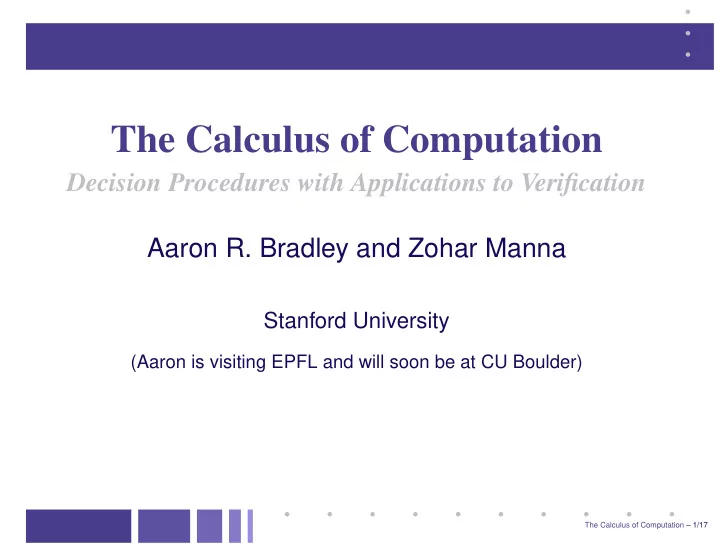

The Calculus of Computation Decision Procedures with Applications to Verification Aaron R. Bradley and Zohar Manna Stanford University (Aaron is visiting EPFL and will soon be at CU Boulder) The Calculus of Computation – 1/17
The Calculus of Computation? It is reasonable to hope that the relationship between computation and mathematical logic will be as fruitful in the next century as that between analysis and physics in the last. The development of this relationship demands a concern for both applications and mathematical elegance. — John McCarthy A Basis for a Mathematical Theory of Computation , 1963 The Calculus of Computation – 2/17
The Calculus of Computation – 3/17
Goals Teach logic as a fundamental tool in engineering. • Present computational view of logic. • Apply logic to specification and verification. • Promote a practical understanding of logic. • Teach the fundamental concepts in verification. • Connect to other topics. The Calculus of Computation – 4/17
Audience • Advanced undergraduate students • Beginning graduate students • Computer scientists and engineers who want to apply decision procedures But assumes very little. The Calculus of Computation – 5/17
Topics: Overview • First-order logic • Specification & verification • Satisfiability decision procedures • Static analysis The Calculus of Computation – 6/17
Part I: Foundations 1. Propositional Logic 2. First-Order Logic 3. First-Order Theories 4. Induction 5. Program Correctness: Mechanics Inductive assertion method, Ranking function method 6. Program Correctness: Strategies The Calculus of Computation – 7/17
Pi : Prove it @ pre ⊤ @ post ∀ m, n. 0 ≤ m ≤ n < | rv | → rv [ m ] ≤ rv [ n ] int [] BubbleSort ( int [] a 0 ) { int [] a := a 0 ; for 2 3 − 1 ≤ i < | a | ∧ ∀ m, n. i ≤ m ≤ n < | a | → a [ m ] ≤ a [ n ] @ L 1 : 4 5 ∧ ∀ m, n. 0 ≤ m ≤ i ∧ i + 1 ≤ n < | a | → a [ m ] ≤ a [ n ] ( int i := | a | − 1; i > 0; i := i − 1) for 1 ≤ i < | a | ∧ 0 ≤ j ≤ i 2 3 ∧ ∀ m, n. i ≤ m ≤ n < | a | → a [ m ] ≤ a [ n ] @ L 2 : 6 7 ∧ ∀ m, n. 0 ≤ m ≤ i ∧ i + 1 ≤ n < | a | → a [ m ] ≤ a [ n ] 4 5 ∧ ∀ m. 0 ≤ m < j → a [ m ] ≤ a [ j ] ( int j := 0; j < i ; j := j + 1) if ( a [ j ] > a [ j + 1]) { int t := a [ j ]; a [ j ] := a [ j + 1]; a [ j + 1] := t ; } return a ; } The Calculus of Computation – 8/17
Part II: Algorithmic Reasoning 7. Quantified Linear Arithmetic Quantifier elimination for integers and rationals 8. Quantifier-Free Linear Arithmetic Linear programming for rationals 9. Quantifier-Free Equality and Data Structures 10. Combining Decision Procedures Nelson-Oppen combination method 11. Arrays More than quantifier-free fragment 12. Invariant Generation Abstract interpretation without the Greek The Calculus of Computation – 9/17
Courses Full course • Semester: time for theorems • Quarter: fast pace or skip some theorems Partial course • Combination procedure track: 5-10 lectures Incorporate into course on theorem proving • Verification track: 5-10 lectures Prepare students for depth in static analysis The Calculus of Computation – 10/17
Track: Combination Procedures 1. Propositional Logic 2. First-Order Logic Theorems: Compactness, Craig Interpolation 3. First-Order Theories 8. Quantifier-Free Linear Arithmetic 9. Quantifier-Free Equality and Data Structures 10. Combining Decision Procedures Theorem: Correctness of Nelson-Oppen The Calculus of Computation – 11/17
Track: Verification Partial & total correctness of sequential programs 1. Propositional Logic 2. First-Order Logic 3. First-Order Theories 4. Induction 5. Program Correctness: Mechanics 6. Program Correctness: Strategies 12. Invariant Generation The Calculus of Computation – 12/17
Courses Exercises • Each chapter includes exercises. Range from applied to theoretical • π VC : Assign exercises throughout course. • Students need time to learn skills. • Students learn to use logic. The Calculus of Computation – 13/17
π VC The Calculus of Computation – 14/17
π VC • Download: http://theory.stanford.edu/~arbrad/pivc • Runs on Linux & Mac OS X • Minimal technical overhead • All exercises from Chapters 5 & 6 The Calculus of Computation – 15/17
Verification Exercises Focus on arrays. Why? • Data structure invariants are common. • Most expressive decidable fragment in book. • Personal bias (previous research). Exercises: • Sorting: from BubbleSort to QuickSort • Searching: linear and binary search • Set operations The Calculus of Computation – 16/17
More Information • http://theory.stanford.edu/~arbrad • I have a copy of the book with me. The Calculus of Computation – 17/17
Recommend
More recommend